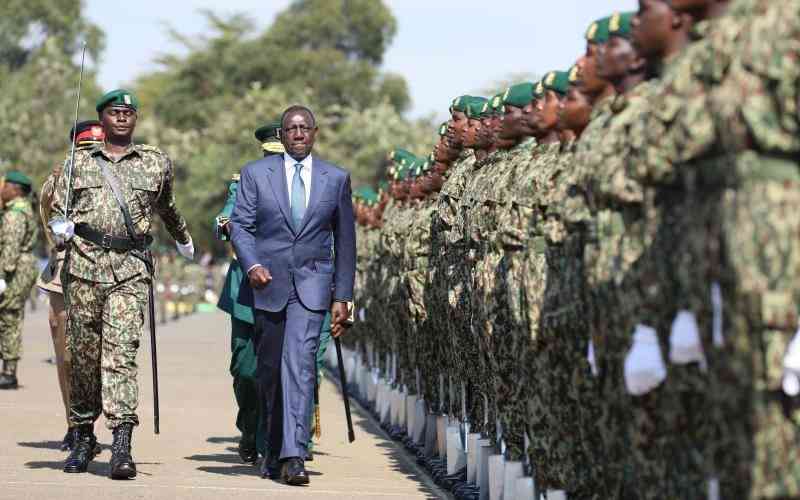
My generation was not taught Kiswahili, it was not an examinable subject.
But circumstances forced us to learn it. We had to communicate with all socio- economic classes.
That is the purpose of a lingua franca. In Uganda it’s Luganda and Swahili in Tanzania.
I find Swahili a fascinating and flowery language. But after visiting Tanzania my view of Swahili has changed.
It’s a language spoken from the heart not mouth. It’s through translations that the “heart” comes out. A good example: dear customer becomes “mpendwa mteja.” Remember that in letters?
Zebra crossing should be kivuko za punda milia, its kivuko za watu. Piercing ears is “kutoboa masikio.” In Tanzania, it’s “kutoga masikio.”
A kindergarten is chekechea. I noted a Kenyan shifting to Tanzania could need a translator in the first few weeks. I too thought the same when I lived in Mississippi, in America’s Deep South.
Talking to 844 graduates, I noted they know a lot of Swahili vocabulary, but they rarely speak the language; It’s not cool.
The creation of new words is making Swahili richer but more difficult. Does this explain why Swahili is losing appeal in Kenya? Swahili, it seems, is no longer the language of ordinary people.
We learnt Swahili on our own because it was easy. It is becoming harder and it resists invasion by English unlike Gíkúyú where words like assume, imagine, or bored are now part of the language. Kúassume, taimangine, or kúmboeka. Don’t over think, I just picked these examples on the streets.
Will the “difficult” Swahili give Sheng a lifeline? I sense this exotic language has been losing its lustre in Kenya?
Curiously, there is no Sheng in Tanzania. They talk undiluted Swahili even among the youth. A Tanzanian student, Alexander Mwesiga, studying in Kenya, was surprised by Sheng. He quoted, “ati someone ni mudeadly?”
In Tanzania, the popularity of Swahili has created an interesting market - English medium schools where the language of instruction in primary school is English. You find that on school signboards and their buses. That is something Kenyans take for granted.
What is the future of Swahili?
What can’t be debated, particularly in Kenya, is that Swahili is not the language of the elite. I hope that thinking is not slowly penetrating into Tanzania.
Stay informed. Subscribe to our newsletter
The growth of the language depends on its acceptance by the elite. That is how Latin survived for so long; it was the language of the church and elite. Some elite schools still teach it. A few elderly men in Kenya still recall masses in Latin.
Swahili greatest risk is not dilution by English but acceptance by elite. As long as they switch to Swahili when angry, joking or abusing someone, Swahili will continue being overshadowed by English.
Will it ever be the Pan-African language? Only if elites take it up, publishing key documents in it, more like European Union and its many official languages. Will it be the working language of African Union and other pan-African bodies?
We must thank Google for being ahead of us, installing Swahili in the search engine. That has promoted Swahili to the global audience. Several radio and TV stations use Swahili outside East Africa.
One area where Swahili doesn’t have a foothold is academic publishing. Imagine scientific papers in Swahili.
The elite might not like Swahili, but it’s one of our best identities. In Tanzania, the elite are at home with Swahili. In Kenya, not yet. Will they ever?
In the next few decades, I see Swahili and English dancing together. Wrestling will follow. In Tanzania, Swahili will win in both contests. Why? Lots of young Tanzanians don’t speak their local languages, Swahili is enough. In Kenyan, English will lose in both contests.
What of other East African countries like Rwanda, South Sudan, DR Congo and Somalia? How much have they invested in Swahili? Rest of Africa?
The easiest way for Swahili to become more acceptable and widespread is for Tanzania to become a political and economic superpower.
That is how English became one of the most widely spoken languages - through conquest and industrialisation.
China, too, is feeding the world with Mandarin; through Confucius Institutes. Beyond financial systems, great powers use language to tie the parts together. Remember the Russian language in the old Soviet Union?
Could the Africa free trade area give Swahili the impetus it deserves? What of proponents of other languages like English or French? Will they sit and watch?
I doubt, when language transmits cultures especially on consumption. The bigger question is if Swahili will grow organically or be catalysed by government intervention.







